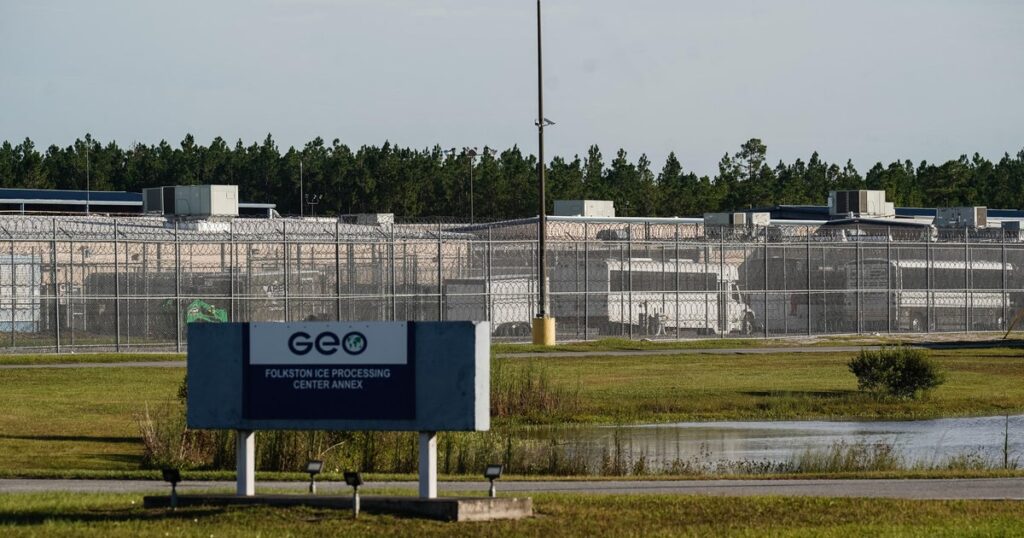In a significant immigration enforcement action, over 300 South Korean nationals were detained by federal agents during a raid at a Hyundai plant in Georgia on September 4. As they await repatriation, tensions arise between the U.S. and South Korea, crucial allies in trade and defense. The incident has sparked political backlash in South Korea, with lawmakers demanding investigations and questioning their government’s treatment by the U.S. amid ongoing discussions about investment and visa policies.
| Article Subheadings |
|---|
| 1) Overview of the Immigration Raid |
| 2) Reactions from South Korean Officials |
| 3) Impacts on U.S.-South Korea Relations |
| 4) Future of Korean Workers in the U.S. |
| 5) Economic Significance of the Ties |
Overview of the Immigration Raid
On September 4, federal agents from Immigration and Customs Enforcement (ICE) conducted a raid at a joint Hyundai-LG electric vehicle battery facility in Bryan County, Georgia. This operation targeted over 475 individuals who were suspected of violating visa regulations. The raid resulted in the detention of more than 300 South Korean nationals, a move that has raised concerns over immigration policy and enforcement practices in the U.S. According to ICE, the individuals detained may have overstayed their visa waiver permits or were working under visas that did not allow for manual labor. Such large-scale enforcement actions have far-reaching implications and touch upon complex legal and socio-economic issues.
Reactions from South Korean Officials
In the aftermath of the raid, South Korean government officials expressed serious concerns regarding the treatment of their nationals. Cho Hyun, South Korea’s Foreign Minister, faced intense scrutiny during a parliamentary session in Seoul. Lawmakers voiced their dissatisfaction, demanding that the government respond adequately to the situation. One prominent lawmaker, Kim Joon-hyun, suggested launching investigations into every U.S. national working illegally in Korea, reflecting a desire for reciprocity in treatment. The narrative was punctuated by expressions of frustration regarding the broader implications for bilateral relations, particularly amid ongoing discussions about trade agreements and investments.
Impacts on U.S.-South Korea Relations
The detention of the South Korean nationals has strained relations between the U.S. and South Korea, which are traditionally aligned on many fronts, including military and economic cooperation. Public sentiment in South Korea appears to be largely negative, with surveys indicating that approximately 60% of respondents view the U.S.’s immigration enforcement as excessive. South Korean President Lee Jae Myung articulated these frustrations, emphasizing the need for respectful treatment of both individuals and corporate interests. In contrast, some U.S. officials, including Marco Rubio, have sought to reassure South Korean officials of the U.S.’s commitment to bilateral ties and investment opportunities.
Future of Korean Workers in the U.S.
Looking ahead, questions arise regarding the future of Korean workers in the United States, particularly as it pertains to visa policies. Kim from the American Chamber of Commerce in Seoul characterized the current situation as a regulatory “blip,” implying that the importance of U.S.-Korean ties will overshadow this incident in the long term. Nonetheless, South Korean officials are pressing for enhancements to the visa system to better accommodate skilled workers from their nation, which has become an integral part of the U.S. economy. These discussions are critical as both countries seek to navigate the complexities of labor demands and economic realities.
Economic Significance of the Ties
The economic relationship between South Korea and the U.S. is substantial, making the current diplomatic tensions even more pressing. South Korea stands as the largest foreign direct investor in the U.S. and ranks as the sixth-largest trading partner. The implication of the raid may lead to deeper discussions on how to facilitate responsible investment while ensuring compliance with legal statutes. Industry experts point out that as the U.S. faces shortages in skilled labor, particularly in sector-specific fields like battery manufacturing and semiconductor production, the need for a balanced approach to immigration and investment becomes essential.
| No. | Key Points |
|---|---|
| 1 | Over 300 South Korean nationals were detained in a federal raid at a Hyundai facility in Georgia. |
| 2 | The South Korean government is responding to the incident with expressions of concern and demands for investigations. |
| 3 | Public sentiment in South Korea is largely negative regarding U.S. immigration enforcement practices. |
| 4 | Future discussions may involve improving visa policies for skilled workers from South Korea. |
| 5 | The U.S.-South Korea economic relationship is significant, complicating the current diplomatic tensions. |
Summary
The unprecedented immigration raid at a Georgia Hyundai plant has elevated tensions between South Korea and the United States, with significant implications for diplomatic relations and future economic partnerships. As both nations grapple with the fallout, discussions surrounding visa policies and investment strategies will emerge as critical components of how they resolve this issue. The situation highlights the intricate balance between security, immigration policy, and the future of international cooperation.
Frequently Asked Questions
Question: What prompted the immigration raid in Georgia?
The raid was conducted by ICE to enforce immigration laws, targeting South Korean nationals allegedly working illegally in the U.S.
Question: What are the implications for U.S.-South Korea relations?
The incident has strained diplomatic ties, raising concerns in South Korea and leading to calls for investigations and greater protection for its citizens abroad.
Question: How does this situation affect future labor policies?
There may be discussions aimed at improving visa policies to accommodate skilled labor from South Korea, given the labor shortages in various industries in the U.S.
